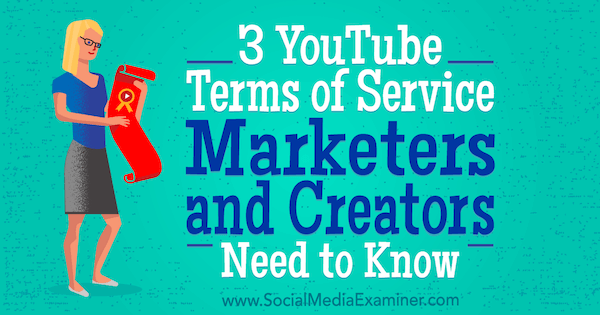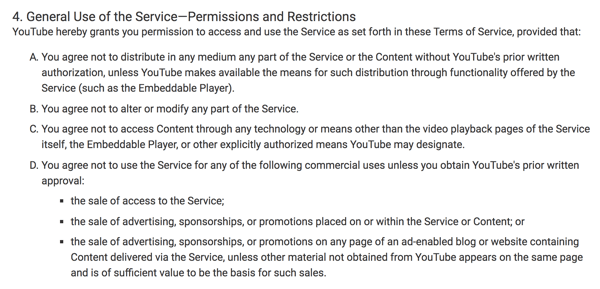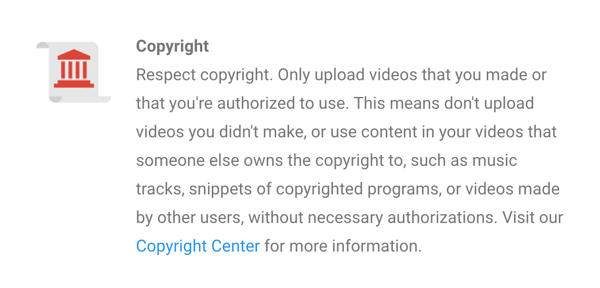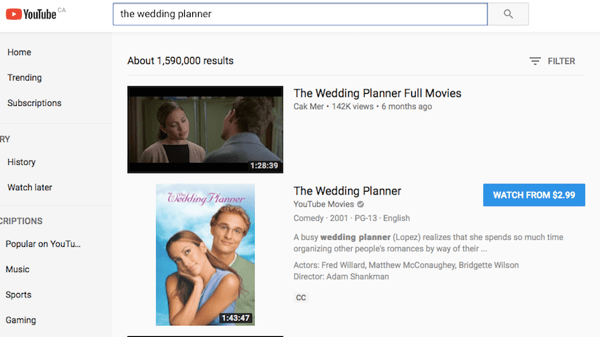 Do you use YouTube in your marketing?
Do you use YouTube in your marketing?
Are you in compliance with copyright laws and YouTube's Terms of Service?
In this article, you'll discover three ways to keep your YouTube channel and video content legal.

#1: Don't Charge People to Watch Your Content on YouTube
As with all social media platforms, when you join, you're agreeing to their Terms of Service. While a lot of users just consume videos on YouTube, social media marketers are using it for their business to reach customers.
However, there are specific commercial uses that aren't allowed on YouTube, one of which is selling access to “the Service” (YouTube) without their written approval. Meaning even if you create your own marketing or teaching video for your business and put it on a private channel on YouTube, you still can't charge your customers to watch it. To do that, you'd need to host your video on another platform.
Of course, what you're able to do is upload it to YouTube and then embed it on the other paid-for platform (the key here is that when your customers are watching, they aren't directly on YouTube).
You also can't sell outside advertising/sponsorships for your videos that are on YouTube, which isn't surprising because YouTube wants you to use their advertising. But in addition to that, you still can't sell advertising if you're hosting your YouTube video on another website unless there's ample additional content that would warrant the ad.
But don't worry, there are plenty of commercial uses that are allowed and serve as a great way to reach your audience. The main uses are uploading videos or having an original channel on YouTube to promote your business, as well as embedding YouTube videos on your website or course platform.

#2: Secure Permission for Music You Include in Your Video
Similar to using a clip from someone else's video, using a snippet from your favorite musical artist at the beginning of your own video could also get you into trouble. While a consistent musical intro/outro is a great way to create brand recognition for your videos, using music tracks without permission is a clear violation of the community guidelines and could land you in hot water with the artist or their representation.
A few things can happen if you use a music track as part of an otherwise original video:

Discover Proven Marketing Strategies and Tips
Want to go even deeper with your marketing? Check out the Social Media Marketing Podcast! Publishing weekly since 2012, the Social Media Marketing Podcast helps you navigate the constantly changing marketing jungle, with expert interviews from marketing pros.
But don’t let the name fool you. This show is about a lot more than just social media marketing. With over 600 episodes and millions of downloads each year, this show has been a trusted source for marketers for well over a decade.
- YouTube may mute your audio, obviously not great for your marketing plan.
- Your account could get a strike and/or be shut down, which is also not helpful to your business if you've been growing a huge following.
- The owner of the music may file a lawsuit.
Similar to using images on other social media platforms, the safest tactics in this scenario are to ask permission, purchase the rights, create or buy your own jingle, or use music that's already in the public domain, meaning a sound or musical work published before 1922.

#3: Respect the Video Copyright of Other Creators and Artists
The world of copyright on the Internet is not only confusing, but also can seem like the Wild West. You're fighting to protect your own content, images, and videos while also refraining from stepping on someone else's rights.
Because YouTube is a platform on which to post and watch videos, it has naturally become a hotbed of infringement. And there's no doubt YouTube spends a fair amount of time dealing with copyright violations, like the sheriffs trying to keep the peace.
Get World-Class Marketing Training — All Year Long!
Are you facing doubt, uncertainty, or overwhelm? The Social Media Marketing Society can help.
Each month, you’ll receive training from trusted marketing experts, covering everything from AI to organic social marketing. When you join, you’ll also get immediate access to:
- A library of 100+ marketing trainings
- A community of like-minded marketers
- Monthly online community meetups
- Relevant news and trends updates
Their main interest may be to keep themselves out of a lawsuit, but they do a good job of enforcing against breaches, thanks to the Digital Millennium Copyright Act. It provides guidance on how host platforms should deal with such issues, as well as provisions that shield them from blame.
YouTube has a tool called ContentID that scours the millions of videos on the platform checking for copyright violations. If they spot a violation, they take down the content. Unfortunately, their tool doesn't catch all infringements and people have learned to beat the system by changing sound or manipulating video.
As an example, let's say you're a wedding planner and decide a great way to market your business is to do a quick live intro video and then show 30 minutes of Jennifer Lopez's movie “The Wedding Planner” just for fun.

Posting even a portion of that movie is committing infringement because you don't own the rights. Because your potential clients are watching it for free, the movie isn't making any money. One of the main purposes of copyright is to protect the work (and profit) of an artist (or in this case, a film company). YouTube would flag this content, take it down, and possibly give your account a big strike.
So how do you avoid committing copyright infringement on YouTube? Infringement occurs any time someone utilizes another person's intellectual property without their permission. On YouTube, this means putting up a video that you don't own the rights to.
Want more like this? Explore YouTube for Business!
.
Conclusion
YouTube is a great platform if you want to use live video to grow your business. The key to staying legit is to comply with their Terms and use your own creative chops to make your videos.
*Nothing in this article is intended to be legal advice and is for educational purposes only.
What do you think? Have you mistakenly violated YouTube's Terms of Service? Are there other safeguards you can suggest? Share your thoughts in the comments below.
Attention Agency Owners, Brand Marketers, and Consultants

Introducing the Marketing Agency Show–our newest podcast designed to explore the struggles of agency marketers.
Join show host and agency owner, Brooke Sellas, as she interviews agency marketers and digs deep into their biggest challenges. Explore topics like navigating rough economic times, leveraging AI, service diversification, client acquisition, and much more.
Just pull up your favorite podcast app, search for Marketing Agency Show and start listening. Or click the button below for more information.

